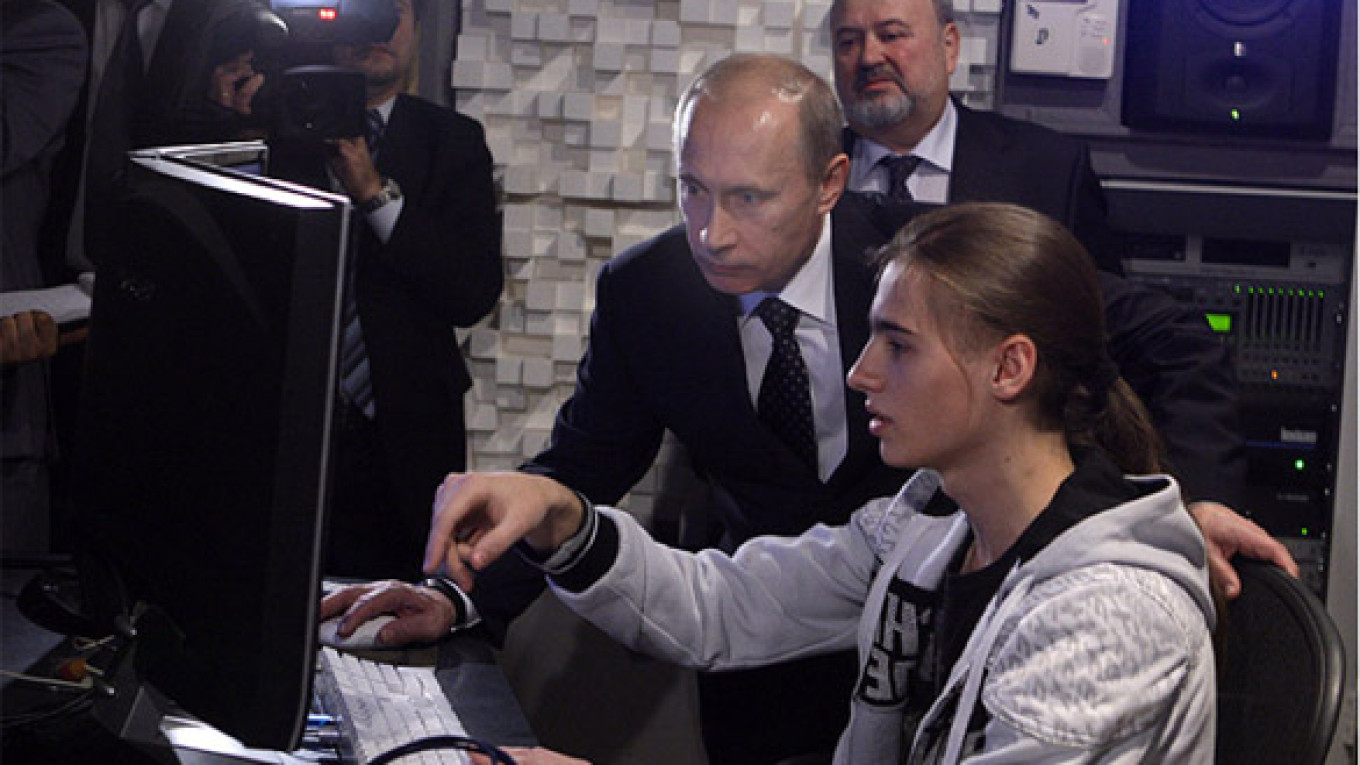Prime Minister Vladimir Putin said the government would increase its funding for moviemakers by more than 50 percent next year but the cinema industry needs to step up to the plate and make a better product.
“Most likely, the movie industry’s problems don’t lie in the amount of funds and tax preferences it gets. … The main problem is the management of these resources, the ability to create a competitive product, gain domestic and international audience,” Putin said Tuesday at a meeting of the governmental council on cinematography.
“The state can provide material support and equipment, organize infrastructure, fix the educational process … but it can’t force the viewer to watch what is of no interest to him.”
Putin toured the All-Russia State Institute for the Cinematic Arts, or VGIK, on Tuesday, which hosted the meeting, tested the institute’s newly built sound studio and was apparently pleased with the way that the state funds were spent.
“We allocated a considerable sum for the development of VGIK, and we’ve just had the opportunity to see how these funds were used,” he said. The money was spent on the construction of a new building and the technical modernization of the institute, he added.
Putin praised the growth of the Russian film industry over the last decade but called for more international exposure. The market share of domestic films has grown to 25 percent from 4 percent a decade ago.
“Our movies traditionally get prestigious awards on international festivals, but our product doesn’t have a large foreign viewership,” he said. “Our goals for economic and cultural influence are not being fully met, [the latter] being one of the most important and serious tasks the national movie industry is facing.”
Only one out of every six Russian movies reaches movie theaters abroad, and those that do on average raise only one-fifth of the revenues raised on the domestic market, he said.
“[The recession] primarily affected cinema infrastructure — put simply, the construction of new movie theaters,” he said. “The positive element, nevertheless, is the 15 percent growth in box office receipts in the first nine months of the year.”
Box office receipts were up 47 percent to $830 million in 2008, from $565 million the year before, according to Kinobusiness Segodnya magazine.
The government will increase funding of the movie industry 55 percent to 4.9 billion rubles ($167.3 million) in 2010, Culture Minister Alexander Avdeyev said Tuesday, adding that the state will now invest directly in film production rather than calling for tenders as it used to.
State funding for moviemaking will come in the form of direct subsidies to seven large production companies, Channel One CEO Konstantin Ernst said Tuesday, adding that the system will be discussed with the Finance Ministry over the next two weeks.
The Federal Foundation for the Social and Economic Support of Cinematography will replace the Culture Ministry in distributing state funds to moviemakers, Deputy Finance Minister Tatyana Nesterenko said Tuesday.
“It has been suggested that the funding mechanism [for the movie industry] go through the foundation, and the foundation will select the production companies that will get the funding,” Nesterenko said. A new mechanism, to be worked out under the guidance of Deputy Prime Minister Alexander Zhukov, will be launched in 2010, she added.
“Book of Masters,” the first movie shot by Walt Disney in Russia, has been running in Russian theaters for a week and has raised 119.2 million rubles ($4 million) so far.
A Message from The Moscow Times:
Dear readers,
We are facing unprecedented challenges. Russia's Prosecutor General's Office has designated The Moscow Times as an "undesirable" organization, criminalizing our work and putting our staff at risk of prosecution. This follows our earlier unjust labeling as a "foreign agent."
These actions are direct attempts to silence independent journalism in Russia. The authorities claim our work "discredits the decisions of the Russian leadership." We see things differently: we strive to provide accurate, unbiased reporting on Russia.
We, the journalists of The Moscow Times, refuse to be silenced. But to continue our work, we need your help.
Your support, no matter how small, makes a world of difference. If you can, please support us monthly starting from just $2. It's quick to set up, and every contribution makes a significant impact.
By supporting The Moscow Times, you're defending open, independent journalism in the face of repression. Thank you for standing with us.
Remind me later.


